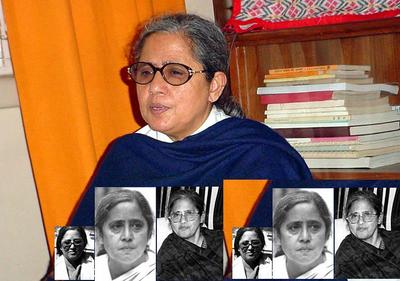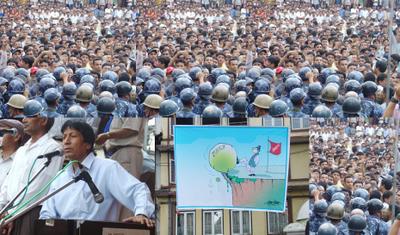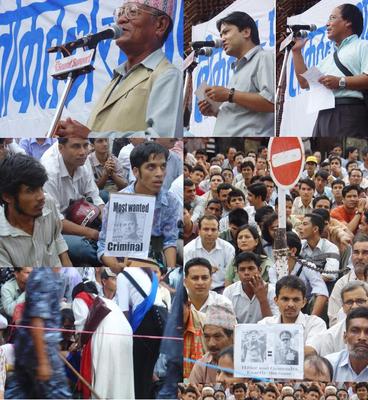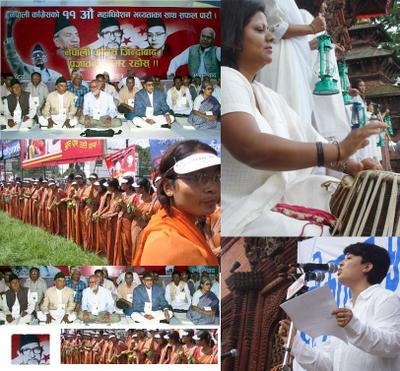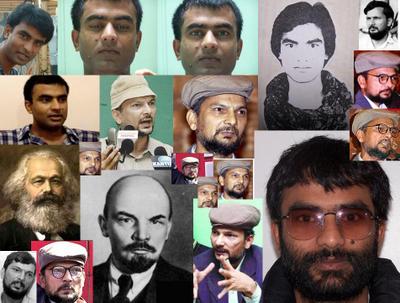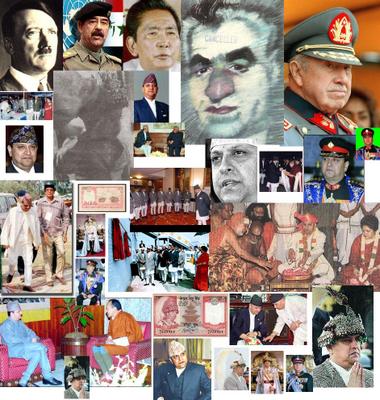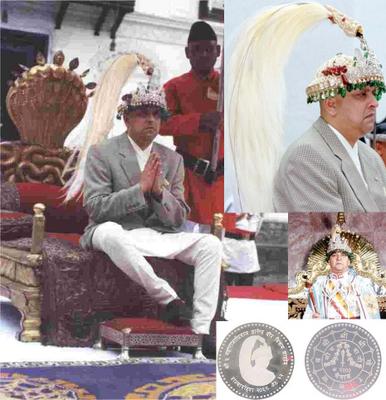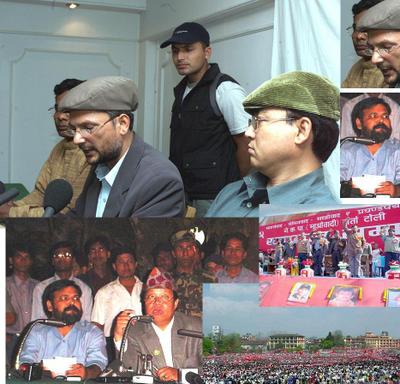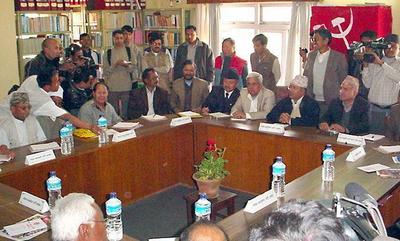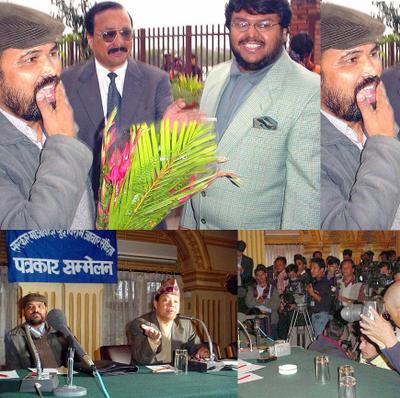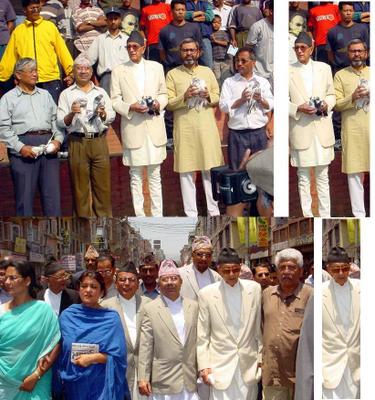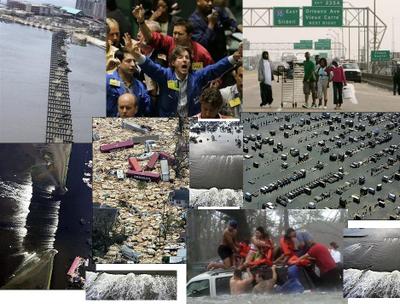
Is this guy for real?
Some questions raised by this press statement.- Does anyone have any idea where this guy is? Is he in Nepal? Is he is Lucknow? Where is his safehouse?
- This guy needs to define the term Constituent Assembly.
- This guy needs to define the term Democratic Republic.
- Is it even possible to reason with this guy?
- Were the Nepali Maoists involved in some of the recent spectacular attacks in Bihar? Two come to mind.
- Where is Ganapathy? Can he be located?
- If Baburam Bhattarai wants Nepal to turn into a Democratic Republic just like India, what do the Indian Maoists want India to turn into? By extension, what do the Nepali Maoists really want? What is the shape and form of the state they hope to create?
- If Baburam Bhattarai is to be trusted, does this mean there is a fundamental ideological rift between him and Prachanda? One that should be exacerbated?
- How come none of the so-called democrats are confronting the Maoists at an ideological plane? Why are they not trying to steal their political and social thunder?
- If these guys are beyond reproach and up for classic Maoism, the king of Nepal ends up looking more legitimate! These Maoists act like they are on the king's payroll, doing his bidding.
Comrade Gonzalo Of Peru: A Profile
Maoist parties of Nepal and India vow to fight `imperialism’
Chairman of CPN (Maoist) Prachanda (File Photo) |
Chiefs of Maoist parties of Nepal and India have vowed to fight jointly what they call US imperialism and Indian expansionism.
In a rare joint statement issued Thursday, general secretary of Communist Party of Nepal (Maoist) Prachanda and general secretary of Communist Party of India (Maoist), Ganapathy, have appealed to the entire oppressed masses, the world over, and Nepal and India in particular, to raise voice against what they called every evil design of imperialism and expansionism to repress the revolutionary cause of the oppressed people in Nepal and India. “We pledge to fight unitedly till the entire conspiracies hatched by the imperialists and reactionaries are crushed and the people’s cause of Socialism and Communism are established in Nepal, India and all over the world,” the joint statement.
The two Maoist leaders alleged that the US imperialism and Indian expansionism were trying to prop up the royal regime in Nepal by providing arms, ammunition, logistics and money in different pretexts.
“A semi-colonial and semi-feudal Nepal-- which was hardly known 10 years before by its name and geographical location in the globe-- has now become a focal point of keen attention the world over. On the one hand, the establishment of people’s power all across the vast countryside of Nepal by way of the people’s war, waged under the leadership of CPN (Maoist) for the last ten years, and one year of strategic offensive in particular, has become a source of inspiration for the oppressed all over the world and, on the other, it has become a deadly ideological and political threat for imperialism, particularly the US imperialism and its puppet regimes, including India,” the statement said.
“In India, the reactionary expansionist ruling classes have stepped up their countrywide coordinated campaign of brutal suppression of the people’s war led by the CPI (Maoist) ever since the merger of the MCCI and CPI (ML)[PW] in September last. They are propagating continuously about the “grave danger” posed by the long Red Corridor of armed struggle stretching from the Base Areas in Nepal up to the guerrilla zones of Andhra Pradesh or the so-called Compact Revolutionary Zone. They have initiated a phenomenal increase in the central repressive forces to tackle the Naxalites, undertaken massive modernization and special training of the forces, and are using helicopters where necessary, along with a package of so-called reforms to wean away the masses from the fold of the Maoists. The democratic voice of the people is suppressed and the fundamental rights guaranteed by the Indian Constitution are trampled underfoot in the vast areas of armed struggle and nationality movements. The ruling classes have also stepped up the attacks against every form of democratic struggle and anti-imperialist movements,” the statement further said.
It was not immediately clear what led the two underground leaders of Maoist outfits to issue a joint statement at this point in time. But analysts say the statement has come at a time when the US government is said to be considering releasing lethal military supplies to the Nepal government in the wake of escalating Maoist violence in the Himalayan kingdom.
The American authorities have, however, made it clear that there must be visible improvement in political situation in the country before the US resumes its military assistance.
US, UK and India had suspended their military assistance to Nepal in the wake of the royal takeover early this year.Maoists Threaten India's Internal Security
Chennai, January 21, 2004
Rapidly and insidiously, a new internal security threat, posed by Left extremists, popularly referred to as Naxalites, is taking shape in India. Unlike secessionist movements fuelled by communal, ethnic and linguistic identity politics that have severely tested - and continue to test - the resolve of the Indian state, the newly emerging threat will challenge India's democratic polity and rule of law as never before.
.....the threat posed by Naxalites is not contained within a particular area. It casts a sinister shadow from Andhra Pradesh in the south to Bihar in the east. Naxalites have already created a 'Compact Red Zone', a corridor across India where Left extremists run a parallel administration with the help of brute force and terror.
Starting from the Telangana region in Andhra Pradesh, the 'Compact Red Zone' runs through eastern Maharashtra, Madhya Pradesh, Chhattisgarh, Jharkhand, Orissa, West Bengal, eastern Uttar Pradesh and Bihar. It links what the Naxalites describe as the "liberated zones" of India with the Maoist-held territories of Nepal; a 'Red Corridor' that has united far-Left comrades in these two neighbouring countries.
...as many as 156 districts in 13 States have been officially listed as "affected by Naxalite violence". In 2003, the threat existed in 55 districts in nine states.
With the geographical spread of the area of their violent political activity expanding by leaps and bounds, Naxalites in India, armed with weaponry and communication systems far more sophisticated than those provided to state police forces (in Andhra Pradesh they are using wireless scanners that can tap into any frequency of police communications), are targeting civil administrators, policemen and politicians with increasing impunity and chilling brutality.
By killing representatives of the state, especially policemen posted in remote rural areas, they are able to instil fear among villagers, most of them impoverished landless farmers, as well as ill-equipped policemen. Thus they are able to establish a parallel system of "administration" of forcibly collecting "taxes" that fund their activities, meting out "justice" through kangaroo courts to eliminate "class enemies", and recruiting fresh cadre through a process of forced and aggressive indoctrination.
In Bihar, seven policemen, including a superintendent of police, were killed in a landmine explosion executed by Naxalites Jan 5. In Uttar Pradesh, a police convoy was ambushed and 17 policemen were shot dead.
The Congress government in Andhra Pradesh that came to power in the summer of 2004 tried to reason peace with Left extremists belonging to the Communist Party of India (Maoist) and Communist Party of India (Marxist-Leninist), the two umbrella organisations under which Naxalites have now organised themselves. It also lifted the ban on these groups. Strategically, that was a disastrous move. The previous Telugu Desam Party government had launched a massive offensive against the Left extremists and was able to bring the situation in many areas under control. That advantage has now been lost.
On the eve of the peace talks in October last year, a senior Naxalite leader was quoted as saying: "By going to the talks, we are not declaring any ceasefire... Talks are a part of our tactical line. Naxalism is not a problem, it is a solution."
Using the ruse of peace talks and the unilateral ceasefire imposed by the Congress government in the state and the placatory attitude of the Congress-led government in New Delhi, the Left extremists have regrouped, re-armed and launched a vicious counter-offensive, forcing the police to respond. The Naxalites, having forced the police to act, are now using it as a convenient excuse to call off the peace process and return to the path of armed violence.
..... they pose a totalitarian challenge to India's democratic polity and rule of law; they pose an ideological threat that questions the legitimacy of the Indian state.
From arms running to narco-terrorism, they are involved in every possible act of subversion.
....what we are seeing now is abusing the barrel of the gun for furthering negative power politics.
In the east, India's Naxalites have teamed up with Nepal's Maoists to create disaffection among people of Nepalese origin who have been living for generations in Darjeeling and Dooars in West Bengal and in lower Sikkim. The purpose is to engineer a movement for 'self-determination' which could unleash violence on a wide scale and much worse than what was witnessed during the Gorkhaland agitation.
India's intelligence agencies have evidence to prove that Naxalites are being used by Pakistan's Inter-Services Intelligence (ISI) for drug trafficking and pumping fake currency notes. In return, ISI is providing the Naxalites with sophisticated weaponry and the know-how for making and using improvised explosive devices. Seized weapons and ammunition bear witness to this evidence.
..... the very real possibility of the Islamic fundamentalist right and the Marxist-Leninist fundamentalist Left joining hands, united by the purpose of subverting the Indian state. Soon after the arrest of Maulana Naseeruddin, one of the prime accused in the murder of Gujarat's former home minister Haren Pandya, Naxalites in Andhra Pradesh came out in support of the Dasargah-e-Jehad-e-Shahadat's demand for the unconditional release of the accused.
Ironically, most states where Naxalite violence is on the rise are ruled by parties or alliances that are members or supporters of the coalition government in New Delhi. And unlike the Congress government in Andhra Pradesh, which now increasingly appears to be repaying a debt of gratitude for electoral support to the Naxalites, the other state governments are unwilling to seek accommodation with the far Left, but are unable to move in tandem in the absence of any clear central policy.
If left alone, today's Naxalite menace could become no less dangerous than the war the Maoists are waging in Nepal with stunning success.
